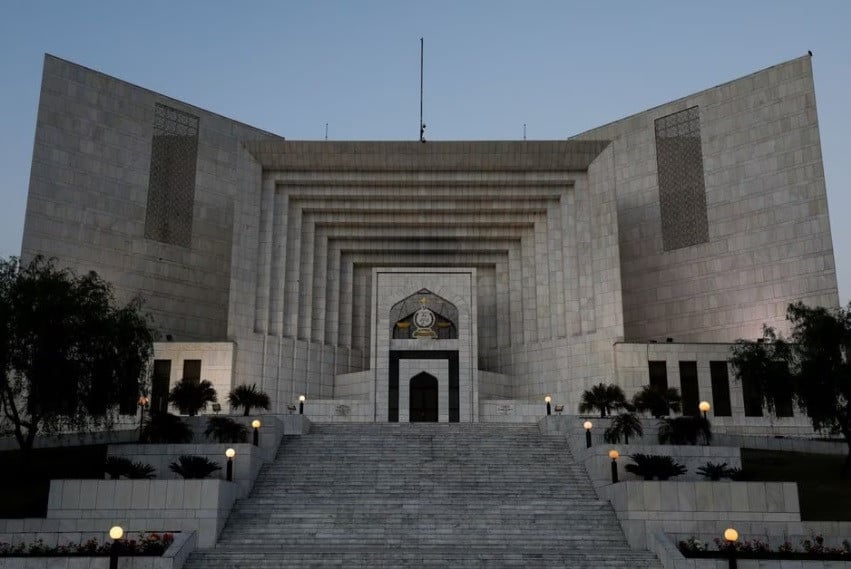
Attorney General for Pakistan (AGP) Mansoor Awan on Friday informed the Supreme Court that 102 people were in the army’s custody and none of them were juvenile or women as an apex court bench resumed hearing the petitions against the trial of civilians in military courts in connection with their involvement in the May 9 violence.
A seven-member top court bench, led by Chief Justice of Pakistan Umar Ata Bandial, and comprising Justice Ijazul Ahsan, Justice Syed Mansoor Ali Shah, Justice Munib Akhtar, Justice Yayha Afridi, Justice Sayyed Mazahar Ali Akbar Naqvi, and Justice Ayesha Malik, heard the pleas.
The AGP further told the court that no journalists or lawyers were in the army’s custody. Awan added that there were doubts about one of the people in army custody as to whether he was 18 years old or below.
The AGP informed the court that tests were being conducted to determine his age and if he was less than 18 years old, he would be sent back.
The CJP pointed out that the material was not attached with the application moved by the commanding officer in the anti-terrorism court for acquiring the custody of civilians to try before the military courts.
Later, the judge passed non-speaking order referring to the cases in the military courts.
The judge noted that a simple way to deal with the situation was to find out the criteria under which cases were referred to the military courts.
He added that no evidence was mentioned in the application.
Justice Bandial clarified that the court would not examine the vires of the provisions which authorised the trial of civilians under the Army Act.
The top judge reiterated that advocates must not harass, adding that both journalists and lawyers had a vital role in the society.
The CJP noted that the bench wanted to learn the internal procedure within the army to acquire the custody of civilians.
The CJP asked the AGP about the policy about journalists and lawyers.
He continued that the court was looking at the case from the angle of civilians’ rights.
The top judge directed the AGP to inquire the caretaker governments in Punjab and Khyber-Pakhtunkhwa about their policies on journalists and lawyers.
He pointed out that some members of the bench had reservations in connection with journalists and lawyers as the society had confidence in the people belonging to both these professions.
At the hearing commenced, the Punjab advocate general submitted a report to the SC detailing the number of people detained or arrested following the May 9 riots, which erupted across the country after the arrest of PTI chairman and deposed premier Imran Khan in a corruption case.
The report highlighted that detention orders for 2,258 people were issued under the Maintenance of Public Order (MPO), while 21 were in prison.
It continued that 1,888 people had been arrested in 51 terrorism cases, with 500 discharged and 232 released on bail. Additionally, another 4,119 had been arrested in 247 other cases, with 1,201 people discharged and 3,012 out on bail.
Faisal Siddiqui, the lawyer representing members of the civil society, came to the rostrum and maintained that he would neither argue that civilians could not be tried under the Official Secrets Acts in the military courts, nor would he comment on the events of May 9.
He claimed that the Army Act was being used “maliciously”.
He pointed out that those tried in anti-terrorism courts could file appeals against the verdicts in their cases.
However, he added that those under trial in the military courts could not challenge the judgments.
Siddiqui maintained that there were old verdicts of the top court about the military courts.
He highlighted that in 1998, a decision was issued against the military courts.
The lawyer underscored that the Army Act was not brought under discussion in that verdict.
“Civil courts are rarely bypassed,” he added.
Justice Ayesha inquired about the principles set about the Army Act in other SC cases.
Siddiqui replied that the past judgments called for a “clear distinction”.
He continued that he was not advocating for a lenient trial of the suspects, asking what could be a tougher hearing than a one held in an anti-terrorism court.
Justice Shah observed that military court trials were announced because of national security.
He added that the laws mentioning trials in the military courts were for those intruding on land related to state security.
The lawyer, in response to Thursday’s hearing about the pleas going to the high courts first, contended that the matter involved more than one province.
Therefore, he argued that the issue could not become the jurisdiction of a particular high court.
He maintained that the pleas were only admissible in the top court.
Justice Ayesha questioned under what circumstances could civilians be tried in
the military courts. The lawyer replied that in the 21st Amendment case, the court had declared that the trial must be related to the Army Act.
The judge then asked if the lawyer’s arguments were complete to the extent that the petitions were admissible and Siddiqui replied in the affirmative.
Justice Ayesha then stated that the crime committed by the accused handed over to the military courts might have been of a different nature, highlighting that the lawyer’s statements were made on the assumption that there was no evidence against the suspects.
Justice Afridi observed that Siddiqui’s arguments were heading in a general direction.
He added that he too was unaware of the sections under which the suspected rioters were handed over to the military courts.
Justice Shah remarked that the law did not say that the Official Secrets Act would only be applicable to those in the armed forces.
He added that the law was also applicable to being within the military’s jurisdiction.
Justice Shah observed that the Official Secrets Act was also applicable to buildings in restricted areas and some civilian buildings.
Justice Naqvi asked Siddiqui when the charges under the Official Secrets Act were added to the FIRs against the suspected rioters.
The judge wondered whether an army commanding officer could seek handing over of the suspected rioters if the provisions of the Official Secrets Act were not included in the FIR.
Justice Shah asked the lawyer to respond to the court’s queries.
The judge asked him about the process for when the Army Act was applicable.
He also inquired how it was determined that a person was an accused under the Army Act.
Justice Ayesha remarked that there was no record before the court.
To this, Siddiqui responded that even if the facts were not present, the case was one of prejudice.
However, Justice Malik stated that for the application of the Official Secrets Act, there was a mention of an insider connection.
Justice Ahsan asked what offences did the Official Secrets Act apply to.
Justice Shah inquired how the army alleged that these people committed a crime.
“We are repeatedly asking you questions but you are not answering them,” he told the lawyer.
Similarly, Justice Ayesha questioned how was it decided that a case would be registered under the Official Secrets Act or the Army Act.
Justice Ahsan then asked the lawyer to tell the top court when the Army Act was applicable.
Justice Akhtar asked Siddiqui if a person was being tried in a civil court, could the army ask for them to be handed over.
Siddiqui contended that it was exactly his argument that the military could not ask for the accused to be handed over to them.
However, Justice Shah asked the lawyer to show the documents to the court in which the army demanded the handing over of the alleged perpetrators.
Justice Ahsan maintained that the law stated that a reference was sent to the federal government when the army asked for suspects to be handed over.
He added that the final decision was made after the government’s agreement.
Justice Naqvi questioned when did the government approve trials of civilians in military courts.
The lawyer replied that the ongoing issue concerned deciding the “forum” of the trials.
To this, Justice Malik noted that the court’s question was how the forum of the trial was decided.
CJP Bandial observed that it was common sense that the army would decide cases under the Official Secrets Act.
He continued that the army could file a request in an anti-terrorism court to hand over the suspects.
The top judge maintained that the army’s request in present matter did not have solid grounds.
He further remarked that the AGP would be asked why the request was not based on solid reasoning.
Justice Shah also asked the lawyer about the procedure for handing over a suspect to the army.
Siddiqui replied that there was no procedure for a complaint or FIR in the Army Act.
The CJP commented that there should be an inquiry into the invoking of the Official Secrets Act.
Justice Bandial added that the suspects’ remand order did not state how and on what evidence they were handed over to the military.
Following a short break, the hearing resumed and Siddiqui clarified that the details about how a trial would commence under the Army Act were included in Army Rules, 1954.
“The process is mentioned in Rule 157, sub-section 13,” he added.
He argued that there was no reason to seek the handing over of the suspects to the military.
He maintained that the suspects were sought on May 25 despite the protests happening on May 9 and 10.
Justice Shah observed that the court would ask the AGP about the inquiry before the framing of the charges.
He continued that the lawyer was claiming that there were no apparent charges against the suspects.
Siddiqui contended that he was saying that a strict inquiry should be carried out before the suspects were charged and that apart from 1988, a civilian government had never allowed civilians to be tried by the military courts.
After his arguments came to an end, former chief justice of Pakistan Jawwad S Khawaja’s lawyer Khawaja Ahmed Hussain began his arguments.
Hussain stated that the primary question was if civilians, who were unrelated to the army, could be tried under military courts and added that he was of the opinion that in the matter at hand, civilians could not be tried in military courts.
He further contended that his client was not opposed to punishment for the accused, but that military courts were not the forum for civilian trials.
The counsel also stated that the other question was whether a civilian could be court-martialed under the Army Act, adding that the law was meant to maintain discipline within the armed forces.
The hearing was then adjourned for Friday prayers.
After the hearing resumed again, Hussain argued that every citizen had the right to a fair trial and could not be deprived of the right. He maintained that decisions for a court martial were also not easily available.
When Justice Shah asked who conducted the court martial proceedings, the lawyer stated that there was a panel that did so. He added that verdicts by the military courts only stated if the accused was guilty or not.
Hussain said the AGP could tell the court if reasons were included in the military court’s decisions.
He added that the army chief was the “final authority” in the process and highlighted that in the case of Indian spy Kulbhushan Jadhav, a special law was promulgated to give him the right to appeal the verdict in an effort to ensure that his rights, under the Vienna Convention, were not breached.
He continued that the Army Act was designed to uphold discipline within the armed forces. Hussain further said that the military’s senior command had reached two conclusions in the press release issued on May 15 -- one that military installations were in fact attacked on May 9 and secondly, there was irrefutable evidence of that.
“After coming to these conclusions, they themselves cannot be the judges of the matter,” he argued.
The CJP then asked him which civilians could be tried under the Army Act.
Justice Bandial further asked him who would be labelled a civilian, inquiring if former army personnel were also “civilians”.
Hussain replied that the Army Act was not prepared with civilians in mind.
Justice Shah questioned if civilians were tried in military courts in other parts of the world, to which Hussain said that every country had its own laws and in Britain, for example, civilians could be tried under military courts.
The lawyer questioned if an officer could follow fair trials in a military court after decisions from the senior leadership of the army.
He added that one could not judge their own case.
Hussain maintained that the SC could issue an order regarding parts of the Army Act that pertained to civilians.
The hearing was then adjourned till Monday.
Four main petitions were filed before the apex court against civilians’ trials in the military courts.
One was moved by the PTI chief through his lawyer, Hamid Khan. The second was filed by civil society members through Advocate Faisal Siddiqui, third by senior politician Chaudhry Aitzaz Ahsan, and the fourth by ex-CJP Khawaja.













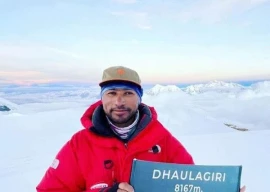

1716317526-0/chai11625120798-2-(1)1716317526-0-270x192.webp)


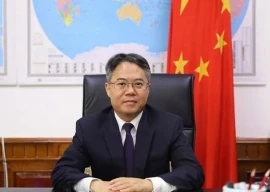

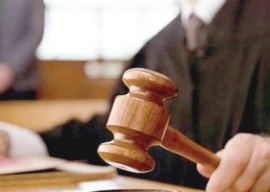
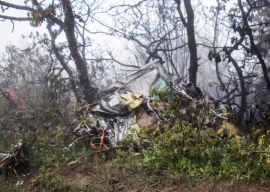







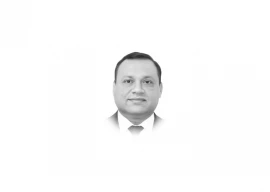

COMMENTS
Comments are moderated and generally will be posted if they are on-topic and not abusive.
For more information, please see our Comments FAQ